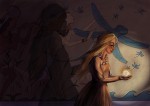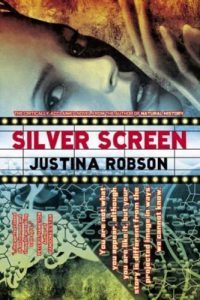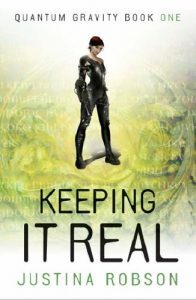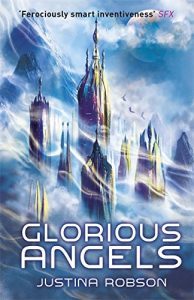Justina Robson: Being the Insufferable Deadpool

It’s a great pleasure to introduce Justina Robson to Nobody Knew She Was There.

Being the insufferable Deadpool
I’ve written this blog three times and thrown it away. I’m on tight deadlines and I don’t have time to write it again but I am because I want to say it right.
When Sarah first asked me to guest blog here on the subject of women’s visibility in SF I was really pleased and sketched out my plan. I was going to say a few obvious things and remark on my own experience which has been remarkably positive given the overarching theme of things, but having read the blogs which have gone before in this series I’ve felt my frustration with the situation steadily ramping up to the point where what I was going to say seems like so much anodyne potwash. I realised that I was also lying by omission by not mentioning stories in case they negatively impacted my fate as that incredibly rare and fascinating creature of outlier statistical mystery, the woman that writes SFF and is still published. Not at living wage levels you understand, don’t get all excited and go thinking I’m in the hay or the gravy or whatever. I’m alive, that’s what counts.
Time out for one second: reading this instead of having me tell it to you myself is lessening the impact and missing the tone. Although since we have the advantage of using your imagination to assist us I think I can do even better than I could in person. You probably have some mental image of me as a woman, a bit earnest, a bit geeky, over 40, mildly sarcastic. That’s not how it is on the inside, where experiences take place, not at all.
I want you to go back and look at the second paragraph and re-imagine me saying them to you as Deadpool. You may be wondering why the red suit? That’s so the bad guys can’t see me bleed…
That’s more like it.
But how did you turn into Deadpool, Justina? Allow me to explain.
First of all there was the cancer.
My initial impression of SF was that it was only for adults, was hard to read and was something my father liked. His copies of Asimov, Orwell and Huxley were my first exposure to literary SF. These things really aren’t for eleven year olds. I learned what SF was from them and I added in my assumption that SF was something which must be of the same scientific integrity as actual science, because my dad was an actual scientist and he was impressed by it. So there I had a model that was complex, boring and required a lot of tedious hard work to understand. It was also about sad, bad things that made adults fearful and involved men doing things with technology and betraying each other. I didn’t notice it was all men so much at that point because in the late 1970s everything was. I tried hard to read it and to like it but failed at both attempts. I felt inadequate and unworthy. I made a note to go back to it later and then returned to my favoured reading: Susan Cooper, Andre Norton, Anne McCaffrey, Mary Renault, Elizabeth Goudge, Tanith Lee and whoever was writing SpiderWoman at the time.
These cancerous meanings about what SF is inform my work to this day, both positively and negatively. Positively: I try hard to think about what matters in a story and give it a thoroughly mature work-over, whatever subject it is I’m writing about. Negatively: I overcomplicate because I see so many angles in an effort not to miss anything. I try to solve everything, especially difficult questions about human nature. I want to impress my dad and show him I’m as good as these men. Dad and I both loved Star Wars and Middle Earth exuberantly. As a result I write with deep sincerity to impress the orthodoxy on bigass SF subjects, whilst my true love of adventure, wild imagination and romance tries to survive the attempt. I should be writing like someone more worthy and in a properly serious manner, says the cancer, I should beat SF at the man game.
Dad died in 1979, impressed with my ability to use long words correctly which is as far as I’d got with the project at the time. Mum told me I could do whatever I wanted. She believed in me. Mum hates SF and Fantasy. With a vengeance. So the cancer of the poisoned SF gets another leg up because I know she and I can’t ever watch together as C-beams glitter in the dark near the Tannhauser Gate. At least she knows that the idea of SF being a man thing is silly. I really don’t want to let her down but I don’t think I’m going to change the world before she dies, or before I do, because the cancer that got me has got a lot of other people too and even if I survive it I can’t do anything about the others.
 The trouble with diseased ideas is that they’re contagious. The meme that SF by women does not sell (is not as good, is not as interesting, is not the real thing) is pernicious. If you’re a man with this meme you may question it or accept it and move on, it’s no big really. For men it’s not a cancer so much as part of the scenery or perhaps an opportunity to take an heroic stand as a feminist supporter. If you are a woman and you contain this meme and you want to write SF then it’s likely that you’ll make the mistake of performing a superhuman effort to prove it wrong as you valiantly continue to host it, instead of doing the smart thing that you do with cancer which is excise it and kill it the fuck dead with chemicals and radiation.
The trouble with diseased ideas is that they’re contagious. The meme that SF by women does not sell (is not as good, is not as interesting, is not the real thing) is pernicious. If you’re a man with this meme you may question it or accept it and move on, it’s no big really. For men it’s not a cancer so much as part of the scenery or perhaps an opportunity to take an heroic stand as a feminist supporter. If you are a woman and you contain this meme and you want to write SF then it’s likely that you’ll make the mistake of performing a superhuman effort to prove it wrong as you valiantly continue to host it, instead of doing the smart thing that you do with cancer which is excise it and kill it the fuck dead with chemicals and radiation.
In the Marvel story Deadpool is offered a way to become a superhero, through a horrible transformation which leaves him unkillable but ugly and able to suffer an endless battery of wannabe lethal assaults – ow. But after that the joke’s on the other guys because he does not stay down. Plus funny. And rude.
But in my early incarnations I was all unwitting cancer victim. My transformation came about much more slowly. There was no hushed crowd waiting to see if I lived. There were only predictable questions about what it was like to be a woman writing SF. Always that first point of contact and interest, always the heartfelt pondering about why it is that men dominate the field. Let’s talk about them some more. Let’s reinforce the cancer a bit further and confirm its power for ever and ever and ever by cementing it into the head of anyone that goes near this article. And I agreed by saying yes, that is how it has been but it’s not…
Meh, by then everyone’s gone on to the next article. I wrote a book about AI, I didn’t turn into one, so that  wasn’t going to be a game changer. Time to read about the next Terry Pratchett (whom I love, by the way, so no dissing our greatest ever satirist).
wasn’t going to be a game changer. Time to read about the next Terry Pratchett (whom I love, by the way, so no dissing our greatest ever satirist).
So I was busy endorsing the plague whilst thinking I was doing something against it. But my eHarmony date with Destiny was already on if I had but known it. I met a fabulous woman who became a good friend of mine. In the course of our early getting to know you conversations we shared a mutual love of immersion in the MMORPG World of Warcraft. And role playing. She’s more hardcore than I am. She makes her own costumes and is regularly mistaken for David Bowie. But more importantly that all that great stuff we discovered is the fact that we’d both secretly been playing the same meta game. In World of Warcraft we were men.
I don’t mean we had male avatars. I mean we were men. I RPed a male character and if there was any metachat about players I was a man then too. When I played I was a man. I wanted to go the whole hog and see if anyone could tell or notice. It wasn’t too difficult to set up – I was safely concealed without any realtime voice chat to give me away. Meanwhile my friend didn’t RP, she was the guild leader of a successful raid guild and had made a male character to avoid all the stupid gamer bullshit that goes with being a woman player/character because not only is the SF cancer around there’s the videogame cancer too: long story short she was also a man behind the screen. She used a top of the range voice changer to make herself over into a slightly toned down version of Brian Blessed. We both got rid of all the hesitations, qualifiers and deferrals from our behaviour and language. Nobody suspected a thing.
The most interesting aspect of the experience for both of us as players is that we really did feel different. It’s very different to being a woman. The lack of shit you have to put up with from other people in general is awesome. Nobody expects you to look after them. They take direction much more easily. The complexity of the RP on both the character and personal front was a great liberation because we completely put down all the What Female Is cancer shit. In addition the What Male Is cancer shit was something we were only toying with so we weren’t there long enough to be poisoned by it. It was a brilliant holiday because everyone unwittingly played along. So the insight from that really began to change the way I felt about my real life position.
And what I felt was – all of this is an RPG and all of the cancerous stuff is optional. Your social upbringing may have sold you some old sob story or convinced you that you have to live up to some parental destiny of your own making, but you’re not obliged to believe it. And since it is all an RPG then the real game is in choosing your character and commanding the stage. The SF isn’t for women meme – like all the social memes – sets the global stage. When I talked as the outlier woman of SF, I endorsed that global stage and gave it power. Now I no longer wanted to do that. I was sick of being the walk-on worthy little try-hard. I couldn’t blame anyone else for that part. I’d agreed, right? So I decided that from now on I was going to be whatever I was at any given moment. SF is for anyone who wants it. Anyone may buy it and anyone can write it and sell it. And, most importantly, I was reclaiming the stage.
Reclaiming the stage is tricky. I can’t re-stage things in another person’s head and I can’t ever know what stage they’re actually playing on. Other people’s minds are their business. Collectively all the jibber jabber about what is what is an effort to constantly reinforce the global stage and to perpetuate the status quo of any given human arena. I can’t influence that global stage directly. But I can fix my own stage up as I like it. By changing myself I can exert forces onto the whole that are apparently more subtle and more profound. It’s me I had to fix up, not the world, not anyone else in it.
 I wrote Quantum Gravity to reclaim the stage for myself and get rid of the cancer. It was my transformative process, in which I took on the endlessly resurgent, resilient, annoying powers and black humour of Deadpool. And his ability to slice up stupid memes to pieces of stinky mental sushi.
I wrote Quantum Gravity to reclaim the stage for myself and get rid of the cancer. It was my transformative process, in which I took on the endlessly resurgent, resilient, annoying powers and black humour of Deadpool. And his ability to slice up stupid memes to pieces of stinky mental sushi.
I understand from a friend that the Quantum Gravity series led some male critic to remark that at last I had shown my true colours – I wasn’t a serious SF writer after all (cos, yeah, the previous four books were suddenly miraculously transformed from intellectual hardcore to pink pony poo, right?) but a trivial scribbler of robot/elf porn.
Two things, anonymous buddy . First, I don’t think you ever saw porn if that’s what you think it is. There are stock romances on the market that make what I write look like Mills & Boon circa 1960. Second, seriously?
As an aside I note that the first book in that series has outsold the sum total of all my other book sales (that’s 9 books) by several times over.
If this situation is going to change outside me and my personal reality then it can only happen if everyone with the power to influence it changes their internal stage and accepts women (and PoC and LGBTQ and all the rest) as players of equal repute and charm. Assert that with confidence, set the scene and the rest will follow. For something like that to happen we need to focus on transformation and creation, the widening of the possibilities for SF and its many consumers. We have to talk as if it’s already real and the field is level. That’s how we have to behave right now.
Instead of that I see lists and handwringing and statistical analysis and individuals either slogging against the meme or leaving the arena. To those holding it who hope for change I say drop the meme and walk away. Find something else to talk about, such as all these great new SF books and films you just found out about. Shake it off like Taylor Swift, because while you were being sad about the sorry state of SF publishing or whatever you could have been reading a fantastic book.
In reality SF is a set of attitudes you can choose and a ton of furniture and props. It’s alive and it’s whatever you’re writing when you think you’re writing it. It’s funny, it’s serious, it’s ludicrous, it’s your heart on a plate with your soul as a scented foam on top. It’s art like any other art. To be an artist you have to be like Deadpool, unkillable, playing your own scene regardless of the lead flying around your head, or in it.
Those seeking to define SF and make sweeping statements about it should do well to listen to the words of Anton Ego, the critic from the movie Ratatouille. “In many ways, the work of a critic is easy. We risk very little, yet enjoy a position over those who offer up their work and their selves to our judgment. We thrive on negative criticism, which is fun to write and to read. But the bitter truth we critics must face is that, in the grand scheme of things, the average piece of junk is probably more meaningful than our criticism designating it so. But there are times when a critic truly risks something, and that is in the discovery and defense of the new. The world is often unkind to new talent, new creations. The new needs friends. Last night, I experienced something new, an extra-ordinary meal from a singularly unexpected source. To say that both the meal and its maker have challenged my preconceptions about fine cooking is a gross understatement. They have rocked me to my core. In the past, I have made no secret of my disdain for Chef Gusteau’s famous motto: ‘Anyone can cook.’ But I realize, only now do I truly understand what he meant. Not everyone can become a great artist, but a great artist can come from anywhere.”
So as my good colleague Chuck Wendig is wont to say. Art. Talk about art with love and enthusiasm and then – Art harder, mother******s. Whoever you are.

Justina Robson has written seven novels. Her debut SILVER SCREEN was published by Macmillan in 1999 and was shortlisted for the Arthur C. Clarke award. Justina would then write MAPPA MUNDI (2001), NATURAL HISTORY (2003) and LIVING NEXT DOOR TO THE GOD OF LOVE (2005).
Justina’s most recent series is the Quantum Gravity sequence, published by Gollancz in the UK (and by Pyr in the US). It is very much a mixture of Science Fiction and Fantasy. Of this Justina says ‘[It] is, among other things, one of those kick-ass-female-protagonist-with-vampire-boyfriend things so beloved of Zeno’s own John Berlyne. Except he isn’t a vampire – he’s an elf. She’s a machine. The other boyfriend is a demon. It’s exactly what you would expect from a serious SF writer. ‘ DOWN TO THE BONE, the fifth-and-final book in the series, was published in 2011 by Gollancz (UK) and Pyr (US).
Justina’s work has been shortlisted for many awards, including the Arthur C Clarke, Philip K Dick, John W Campbell and BSFA Best Novel. In 2001 she was joint winner of the Amazon Writer’s Bursary which led to a brief period as Writer in Residence at Queen Mary & Westfield College, London. Her short fiction has appeared in various anthologies and collections.
In addition to writing she enjoys the occasional teaching position at The Arvon Foundation. She has also appeared as a guest participant in the following projects: The Foresight Project, BioCentre, and Human Futures@FACT .
She wavers between taking herself very seriously and not seriously at all. She finds writing about herself in the third person very strange.
Find out more by visiting Justina Robson’s web site.



